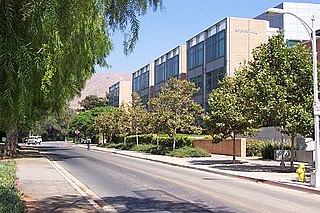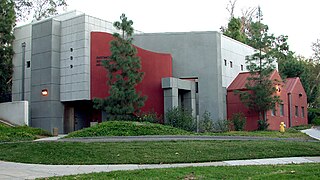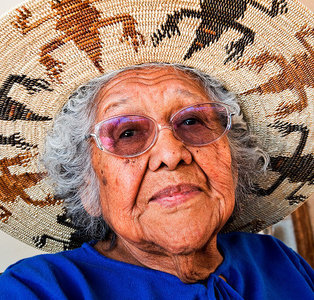Related Research Articles

The University of California, Riverside is a public land-grant research university in Riverside, California, United States. It is one of the ten campuses of the University of California system. The main campus sits on 1,900 acres (769 ha) in a suburban district of Riverside with a branch campus of 20 acres (8 ha) in Palm Desert. In 1907, the predecessor to UCR was founded as the UC Citrus Experiment Station, Riverside which pioneered research in biological pest control and the use of growth regulators.

The Marlan and Rosemary Bourns College of Engineering, commonly known as 'Bourns Engineering' or 'BCOE', is a college of engineering at the University of California, Riverside. The college was established in 1989, and named in honor of Marlan and Rosemary Bourns, founders of Bourns, Inc. It is accredited by the Accreditation Board for Engineering and Technology.

The Entomology Research Museum is the insect collection of the Department of Entomology of the University of California, Riverside. It contains approximately 4 million total insect specimens, over 3 million of which are pinned, roughly 400,000 mounted on slides, the remainder preserved in ethanol. Of the ~4 million curated holdings, approximately 75% of are identified to genus level or better. An estimated 25% of the entire collection are Hymenoptera, 21% are Coleoptera, 18% Diptera, and 18% Lepidoptera.
The history of the University of California, Riverside, or UCR, started in 1907 when UCR was the University's Citrus Experiment Station. By the 1950s, the University had established a teaching-focused liberal arts curriculum at the site, in the spirit of a small liberal arts college, but California's rapidly growing population made it necessary for the Riverside campus to become a full-fledged general campus of the UC system, and it was so designated in 1959.

The California Museum of Photography is an off-campus institution and department within the College of Humanities, Arts, and Social Sciences at the University of California, Riverside, located in Riverside, California, United States.
The University of California Citrus Experiment Station is the founding unit of the University of California, Riverside campus in Riverside, California, United States. The station contributed greatly to the cultivation of the orange and the overall agriculture industry in California. Established February 14, 1907, the station celebrated its 100th anniversary in 2007.
The main campus of the University of California, Riverside (UCR) is located within the city of Riverside in western Riverside County, three miles (5 km) east of downtown, and comprises 1,112 acres (4.50 km2) bisected by the Interstate 215/State Route 60 freeway. Nearly half of the total area is devoted to agricultural teaching and research fields, most of which are located west of the freeway.

The UCR Citrus Variety Collection (CVC) is one of the most important collections of citrus diversity in the world. It is used for research, plant breeding, and educational extension activities on the UC Riverside campus in Riverside, California.
Henry L. Snyder was professor emeritus of history at the University of California, Riverside, and the former director of the Center for Bibliographical Studies and Research. He served as a co-director and the leader of the American English Short Title Catalogue team for more than 32 years.

Katherine Siva Saubel was a Native American scholar, educator, tribal leader, author, and activist committed to preserving her Cahuilla history, culture and language. Her efforts focused on preserving the language of the Cahuilla. Saubel is acknowledged nationally and internationally as one of California's most respected Native American leaders. She received an honorary PhD in philosophy from La Sierra University, Riverside, California, and was awarded the Chancellor's Medal, the highest honor bestowed by the University of California at the University of California, Riverside.

The University of California, Riverside, is organized into three academic colleges, two professional schools, and two graduate schools. These units provide 81 majors and 52 minors, 48 master's degree programs, and 42 PhD programs. It is the only UC campus to offer undergraduate degrees in Creative Writing and Public Policy, and one of only three UCs to offer an undergraduate degree in Business Administration. Additionally, UCR's doctoral program in the emerging field of Dance theory, founded in 1992, was the first program of its kind in the United States. UCR's various academic units are as follows:
Paul J. D'Anieri is Professor of Public Policy and Political Science and former Executive Vice Chancellor & Provost of University of California, Riverside. Prior to his position at UCR, Dr. D'Anieri served as the dean of the University of Florida College of Liberal Arts and Sciences (CLAS), from July 2008-June 2014 and the associate dean for humanities from 2004 to 2008 and associate dean for international programs from 1999 to 2003 at the University of Kansas.

Riverside County is a county located in the southern portion of the U.S. state of California. As of the 2020 census, the population was 2,418,185, making it the fourth-most populous county in California and the 10th-most populous in the United States. The name was derived from the city of Riverside, which is the county seat.

The University of California, Riverside (UCR), School of Medicine is the graduate medical school of the University of California, Riverside, acting as one of six University of California medical schools. It enrolled its first class in 2013, with the first class of 40 medical students receiving their degrees on June 9, 2017.
Georgia Warnke is a Distinguished Professor of Political Science and the Director of the Center for Ideas & Society at the University of California, Riverside. She chaired the Department from 2002 to 2004. She also acted as the Associate Dean for Arts and Humanities, College of Humanities, Arts and Social Sciences at UCR from 2006 to 2011.
Rupert Costo was a Cahuilla writer, activist, publisher, and philanthropist. He was a co-founder of the American Indian Historical Society (AIHS) and the Indian Historian Press publishing company. Costo had many careers and avocations throughout his life, including farmer, cattle rancher, surveyor, and mineralogist. He also served as an engineer for the California Division of Highways for nearly 20 years.
Matthew Sakiestewa Gilbert is a distinguished associate professor in the department of history and a Dean's Fellow and Conrad Humanities Scholar in the College of Liberal Arts and Sciences at the University of Illinois at Urbana-Champaign. He is an enrolled member of the Hopi Tribe. A graduate of The Master's College, Talbot School of Theology, and the University of California, Riverside, Gilbert specializes in researching and teaching on Native American history and the American West.
Ruth K. Chao is an American psychologist. Her research interests center around the parenting styles and socialization of East Asian immigrant families, especially Chinese families, in the United States and Canada. She is an associate professor in the Psychology Department and the principal investigator for the Multicultural Families and Adolescents Study (MFAS) research project at the University of California, Riverside. She is a board member of the Global Parenting Education Group, a nonprofit organization that focuses on parent education in China and other countries.
Cheryl Metoyer is an Eastern Band Cherokee researcher and professor of library and information science. Her research is focused on Indigenous systems of knowledge, especially in relation to American Indian and Alaskan tribal nations, as well as ethics and leadership in cultural communities. She holds the position of Associate Professor Emeritus and the Director of the Indigenous Information Research Group (IIRG) at the iSchool at the University of Washington.
Jeannette Henry Costo (1908–2001) was an American activist, author, editor, and journalist. She co-founded the American Indian Historical Society (AIHS), and the Indian Historian Press publishing company.
References
- ↑ "Carney Oral History Transcript" (PDF).
- ↑ "UCR Research". University of California, Riverside, Office of Research. Retrieved 2007-08-10.
- ↑ "California Center for Native Nations: Home". ccnn.ucr.edu.
- ↑ "Untitled Document". americanindian.ucr.edu.
- ↑ Regus, Elaine (October 19, 2007). "UCR's long effort to preserve California's newspapers goes online". The Press Enterprise . Retrieved 2007-10-20.
